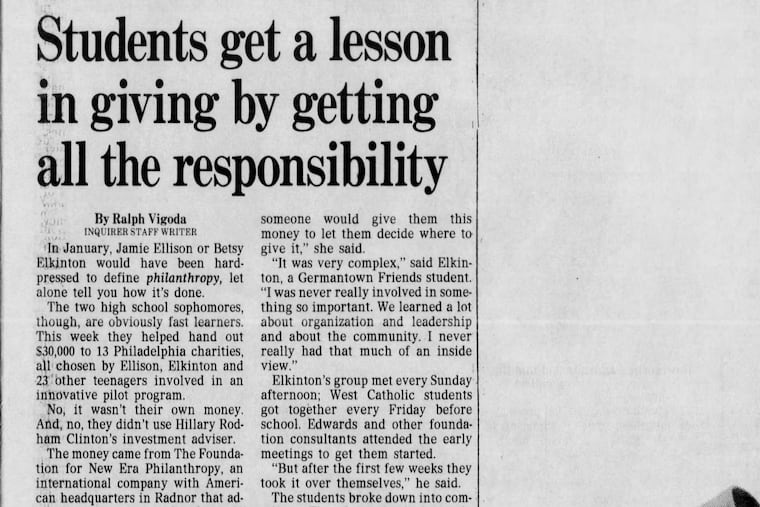From The Inquirer archives: Students were fast learners when it came to giving out money
High school students learned what to look for when they helped fund charities.

This article originally appeared in The Inquirer on May 12, 1994.
In January, Jamie Ellison or Betsy Elkinton would have been hard-pressed to define philanthropy, let alone tell you how it’s done.
The two high school sophomores, though, are obviously fast learners. This week they helped hand out $30,000 to 13 Philadelphia charities, all chosen by Ellison, Elkinton, and 23 other teenagers involved in an innovative pilot program.
The money came from The Foundation for New Era Philanthropy, an international company with American headquarters in Radnor that administers grant money for about 150 clients. Last fall, Dave Edwards of the foundation put together Youth in Philanthropy, a project designed to familiarize young people with giving.
“Jack Bennett, our president, came up with the idea,” Edwards said. “He saw that society mentors kids in a lot of different areas, but if you look at philanthropy, the world of foundations and nonprofits, there wasn’t a lot of mentoring.”
Giving doesn’t come naturally, Edwards said.
“So,” he said, “we wanted to get kids excited about the process of giving and the experience of being responsible in administering a sizable amount of money.”
First, Edwards had to come up with a sizable amount of money. The foundation set aside $15,000 from its discretionary fund.
Then he had to find a couple of schools. Germantown Friends School and West Catholic High School were chosen because each is known to New Era; two students each from Martin Luther King High School and the Lankenau Motivational Program were then added.
Finally, there was an incentive for the groups. Edwards promised to double the $15,000, which was split evenly between the Friends and West Catholic groups, if the students followed a series of requirements, including attendance at meetings, written reports, and raising at least $100 on their own.
That’s how the $15,000 grew to $30,000. Actually, $30,350, counting the students’ fund-raising efforts.
The students and foundation personnel gathered in January at the Union League to get their first lesson in corporate giving. Sister Eileen Francis Cooke, who was adviser for the West Catholic group, said her charges took a while to get over the shock of being handed thousands of dollars.
“There was amazement … that someone would give them this money to let them decide where to give it,” she said.
“It was very complex,” said Elkinton, a Germantown Friends student. “I was never really involved in something so important. We learned a lot about organizations and leadership and about the community. I never really had that much of an inside view.”
Elkinton’s group met every Sunday afternoon; West Catholic students got together every Friday before school. Edwards and other foundation consultants attended the early meetings to get them started.
“But after the first few weeks, they took it over themselves,” he said.
The students broke down into committees. They determined what were the greatest needs in their communities and which organizations dealt with them. They put out requests for proposals to the charities and made site visits to see how donated dollars were used. Each group analyzed about a dozen charities before deciding which ones should get the grants.
And that proved to be one of the hardest parts.
“A lot of the people wanted different charities,” said Monica Brady, a West Catholic sophomore. “It was a hard decision to make because they were all doing a lot of good.”
Said Jamie Ellison, who attends Lankenau Motivational: “Everybody had their own opinion. But we worked together and came up with the right choices.”
The 13 grants ranged from $1,000 to $4,000 to such organizations as the Police Athletic League, the Center for Literacy, and Parents United for Better Schools. They were awarded Monday night at a dinner in Bryn Mawr for foundation staff, the students, and representatives of the charities.
“It was exciting for me to see how a group of kids who knew nothing of the world of philanthropy took on the task of making tough decisions on who gets what,” Edwards said. “Considering the amount of time they had, they really tackled it and did a great job.”
Edwards said the foundation would meet in a few weeks with the idea of expanding the program during the next school year.
“We’re really excited about the potential this sort of program has,” he said.
In addition, a number of students learned a new vocabulary word.
“Philanthropy doesn’t have to be just giving away money,” Elkinton said, ''but giving away something important to help others. It could be anything to help those in need."